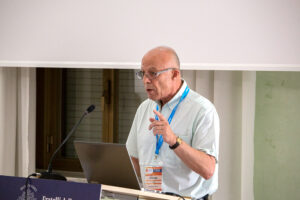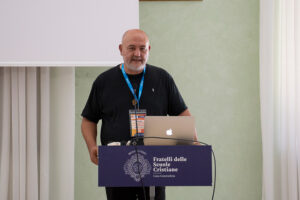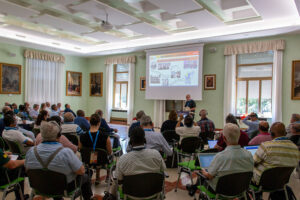‘Leavening’: an apostolic movement of Lasallians

The Leavening Movement is an invitation to each Lasallian, community, educational work and to the entire Lasallian Family, to initiate a movement to go out to the peripheries to deliver the Gospel, through education, and to meet God there.
According to Br. Alfonso Novillo, Secretary General of the Institute, “the new structure of government, based on the three Councils (General, CIAMEL and Economic), the Offices and the Commissions, facilitates a greater development of the Pathways of Transformation defined by the 46th General Chapter, through structures of reflection, deliberation and advice”, which also favours “aligning, integrating and implementing our commitments to the peripheries at local, regional and global levels”.
Generating a renewing effect
 From a synodal perspective “we have the opportunity to generate a renewing effect from cross-pollination, taking advantage of the multiculturalism of the Institute, finding dynamics to broaden the vision and generating connections with very distant projects, immersed in the peripheries similar to each other,” said Brother Martín Digilio, General Councillor, referring to the ‘Leavening Movement’ as an apostolic movement to “touch hearts”.
From a synodal perspective “we have the opportunity to generate a renewing effect from cross-pollination, taking advantage of the multiculturalism of the Institute, finding dynamics to broaden the vision and generating connections with very distant projects, immersed in the peripheries similar to each other,” said Brother Martín Digilio, General Councillor, referring to the ‘Leavening Movement’ as an apostolic movement to “touch hearts”.
“The principle that energises the ‘Leavening Movement’ is that of simultaneity”, continued Brother Martín, pointing out that “it is necessary to harness the great capacity for advocacy that our Institute has in all the places where we are, in terms of the richness of the people, the quantity and diversity of experiences and educational projects but, above all, the common mystique that animates us”, for which it will be of great importance to count on the entities of the Regions, where “the Visitors’ Conferences play a fundamental role, from the agreements that are generated”.
On the practical front, Br. Michael Fehrenbach, Visitor of the Midwest District of the United States, believes that “being part of a ‘Leavening community’ means that when we enter the reality of people on the peripheries, we engage them, we understand the need for justice and we are evangelised by them as we enter their lives”.
 In the case of the District of Australia-New Zealand-Papua New Guinea and Pakistan, its Visitor, Brother Timothy Peter, indicates that “in four sectors of the District we are looking at the poor and in particular with those that are suffering from mental health problems and those suffering from bullying situation in schools“.
In the case of the District of Australia-New Zealand-Papua New Guinea and Pakistan, its Visitor, Brother Timothy Peter, indicates that “in four sectors of the District we are looking at the poor and in particular with those that are suffering from mental health problems and those suffering from bullying situation in schools“.
Similarly, in the framework of the ‘Leavening Movement’, the District of Madagascar hopes to “create a centre for young farmers which will offer two types of training: educational training for future professional technicians and training for those who have not completed their studies, so that they can access employment”, explains its Visitor, Br Julien Ratsimbazafy.
Lasallians in Italy have also been making choices in the perspective of the ‘Leavening Movement’. “The experience of Scampia, in Naples, rescues young people from a neighbourhood where drugs, especially cocaine, are sold, supports them in their academic recovery and helps them to obtain qualifications” which will allow them to have a new opportunity. Hence “Scampia acts as leaven”, concludes Br Gabriele Di Giovanni, Visitor of the District of Italy.